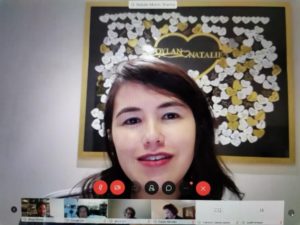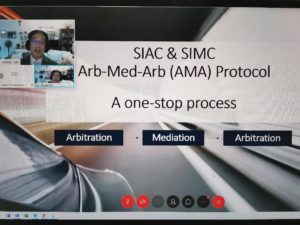Co-organised by YSIAC’s Ms Kirsten Teo and Young ICSID’s Ms Celeste Salinas Quero, this YSIAC-Young ICSID webinar on the impact of the Singapore Convention on Mediation (“Convention”) on international investment disputes brought together five visionary speakers across four time-zones and attracted hundreds of attendees from 50 countries worldwide.
With Mr Diogo Pereira (Partner, De Almeida Pereira PLLC, Washington DC) as moderator, the panel was comprised of the following esteemed speakers: Mr Gary Born (President, SIAC Court of Arbitration; Chair, International Arbitration Practice Group, Wilmer Cutler Pickering Hale and Dorr LLP); Mr George Lim, Senior Counsel (Chairman, Singapore International Mediation Centre); Ms Natalie Y. Morris-Sharma (Deputy Senior State Counsel, Attorney-General’s Chambers; Chair, UNCITRAL Working Group II); Ms Frauke Nitschke (Senior Legal Counsel, ICSID); and Dr Judith Knieper (Legal Officer, UNCITRAL).
Ms Morris-Sharma gave an overview of the negotiating milestones, compromises reached among the different delegations, and the drafting process of the Convention, during which time she was the Chair of the UNCITRAL Working Group II on Dispute Settlement. She explained that the Convention (a) applies to mediated settlement agreements and not agreements to mediate, (b) applies to investment disputes, (c) offers certainty to the enforcement of mediated settlement outcomes, and (d) broadens the dispute resolution options in combination with litigation and arbitration. To date, there are 52 signatories to the Convention which has been ratified by 4 countries, and the Convention is expected to enter into force on 12 September 2020.

Dr Judith Knieper presented on the structure and history of UNCITRAL, as well as the mediation framework offered by UNCITRAL, which includes the 1980 UNCITRAL Conciliation Rules and the 2002 UNCITRAL Model Law on International Commercial Conciliation. She referred to on-going plans to update these documents, and current negotiations on the draft UNCITRAL Mediation Model Law which is anticipated to be finalised in 2020. In addition, Dr Knieper shared her perspective on the negotiations of the Convention and summarized the work in progress of the UNCITRAL Working Group III on promoting the use of mediation in investor-state dispute settlement.
Thereafter, Ms Nitschke set out a detailed presentation on the new proposed ICSID Mediation Rules (see also previous post here). She commented that participation in the ICSID mediation framework would be entirely voluntary – “ongoing consent” would be needed, and parties would be able to unilaterally withdraw at any time. She also noted the growing interest in mediation globally, as reflected by an increasing number of references to mediation in treaties, and the 2016 Guide on Investment Mediation adopted by the Energy Charter Treaty. Ms Nitschke sees the Convention as a way to address this growing interest – she referred to a survey conducted by the International Mediation Institute (with the New Jersey City University Institute for Dispute Resolution) which indicated that 84% of the respondents were more likely to consider mediation as a means to resolve disputes, if there was a global enforcement mechanism for mediated settlement agreements.
Mr George Lim, SC, spoke about how the Convention has promoted mediation as a dispute resolution tool in various countries, and provided the example of India which is in the process of drafting a domestic legislative framework on mediation after it signed up to the Convention in August 2019. He also shared about the hybrid arb-med-arb protocol implemented by the Singapore International Mediation Centre (“SIMC”) in conjunction with the Singapore International Arbitration Centre (“SIAC”). He also gave young practitioners tips on being a successful mediator, summing them up with his 3 ‘P’s – people skills; (mediation) process skills; and problem-solving skills.

Mr Gary Born rounded up the panel discussion with an emphasis on the importance of fair and legitimate dispute resolution mechanisms such as the Convention, to promote global trade and commerce. He commented that the Convention is off to a good start given the sizeable number of signatories to date, in view of the number of initial signatories to the 1958 New York Convention (for further reference, please see here). Further, Mr Born discussed the interconnectedness of mediation and arbitration, by sharing his perspectives on the role of arbitrators in encouraging mediation and echoing the close collaboration between SIAC and SIMC pertaining to the arb-med-arb protocol (for more on what the Convention means for arbitration and the future of dispute resolution, also see here). He also provided valuable insights on multi-tiered dispute resolution clauses – such clauses, though put in place with good intentions, could throw up jurisdictional/admissibility issues in arbitration, and must be drafted with care.

The panel’s comments were useful in confirming that the Convention is intended to, and does, apply to investor-state dispute settlement. It was also heartening to see key players like UNCITRAL and ICSID actively engaged in further developing a comprehensive framework for mediation to be used as a dispute resolution tool. The panel’s insights also drove home the point that international arbitration and mediation are complementary mechanisms of resolving disputes. Depending on the circumstances, a combination of processes could be effective – for example, mediation can be used to narrow down the key disputed issues to be decided in arbitration, which could save time and costs overall.
A common thread throughout this panel discussion was the recognition that the global community has a strong growing interest in using mediation, to resolve not only commercial disputes but also investor-state disputes. The Convention is a testament to this reality. Only time will tell how this landscape will continue to evolve – but for now, the future for international mediation is bright.
The webinar recording and power-point slides are available for viewing on the websites of ICSID and SIAC.
________________________
To make sure you do not miss out on regular updates from the Kluwer Arbitration Blog, please subscribe here. To submit a proposal for a blog post, please consult our Editorial Guidelines.


